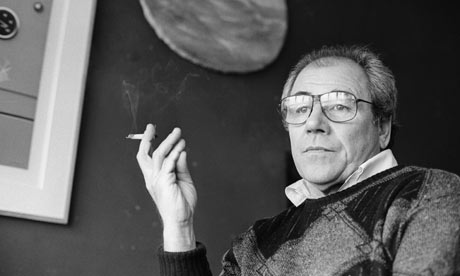
In the preface to his 1930 classic, Cooking in Ten Minutes, just before the chapter that begins "First of all I must tell you that this is a lovely book" (which it is), Edouard de Pomiane explains his philosophy. "This book is meant for the student, for the midinette, for the clerk, for the artist, for lazy people, poets, men of action, dreamers and scientists, for everyone who has only an hour for lunch or dinner and yet wants half an hour of peace to watch the smoke of a cigarette while they sip a cup of coffee which has not even time to get cold."
De Pomiane clearly did not have Andy Burnham in mind. For although the health secretary has the slightly louche – artistic, poetic, even – appearance of a man not unacquainted with the kohl pencil, if he had his way the post-prandial cigarette would soon be consigned to history, remembered only as a curious, quaint habit, as outlandish and distant a memory as the Labour politicians who were proud to call themselves socialists. Under new government plans, those of us who have already been banished to office doorways could find ourselves searching even further for a place in which to light up. But that is not the limit to Burnham's ambitions. "One day," he said, "we'll look back and find it hard to remember why anyone ever smoked in the first place."
I have no desire to impose my habit on others; but that is not enough for those of Burnham's ilk. They wish to force me to "improve" myself. And how swiftly this new puritanism has carried all before it. In my first job, at the Sunday Telegraph, I had smokers to my left and facing me, while at the Evening Standard in the late 90s you could tell the midday deadline was approaching by the increasing density of the fug above the editorial floor. When a news executive organised a petition to ban smoking, the editor finally replied that after due consideration he would reject the advice, as he did not want key staff having to disappear as the presses were due to roll. (We all knew the real reason: he didn't want to give up his cigars.) It was not until 2000 that I found myself working in a smoke-free environment. The smoking room at the Independent was so foul it was enough to make anyone want to give up, but even that had to shut its (poorly-working) ventilator down after the last round of legislation in 2007.
The joys of visiting New York – a city of sinful pleasures, if there ever was one – were diminished in 2003 when they banned smoking in bars and restaurants, which also disrupted the harmony of that natural combination, the drink and the cigarette. I remember standing in the doorway of an Upper West Side jazz club, ironically enough called Smoke, trying to argue that as my hand holding a drink was inside the door while that clutching a cigarette was outside, I should be allowed my dual pleasure – but in vain.
A collection of matchboxes is all that remains of happy times in many an establishment, from the Oxo Tower to the Groucho, when I was never alone – if not with a Strand, then at least with a packet of Peter Stuyvesant Luxury Length ("Wherever you go, so much more to enjoy!"). It was truly, as the legend had it, "the international passport to smoking pleasure".
Now, even images of Isambard Kingdom Brunel are required to appear minus his trademark cigar, and if Burnham gets his way future generations will need to consult the reference books to understand the term "the cigarette afterwards", while the double entendre in another Stuyvesant ad line – "for after-action satisfaction" – will pass them by entirely.
No, such romance is beyond our dreary health secretary. Edouard de Pomiane, on the other hand, citizen of a more gracious time that he was, knew what he was talking about. I leave you with his advice on how to end a meal.
"Sink into your comfortable armchair; put your feet on a chair. Light a cigarette – Turkish or Virginian, according to your particular weakness. Send a puff of smoke slowly up to the ceiling. Sniff up the perfume of your coffee. Close your eyes. Dream of the second puff, of the second sip. You are fortunate."
Really, I ask, who could disagree?

